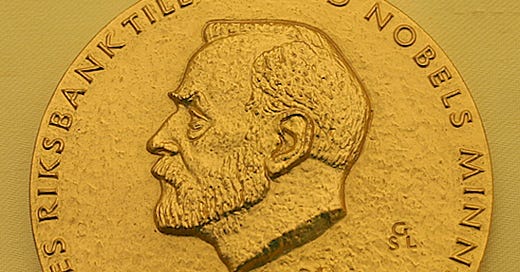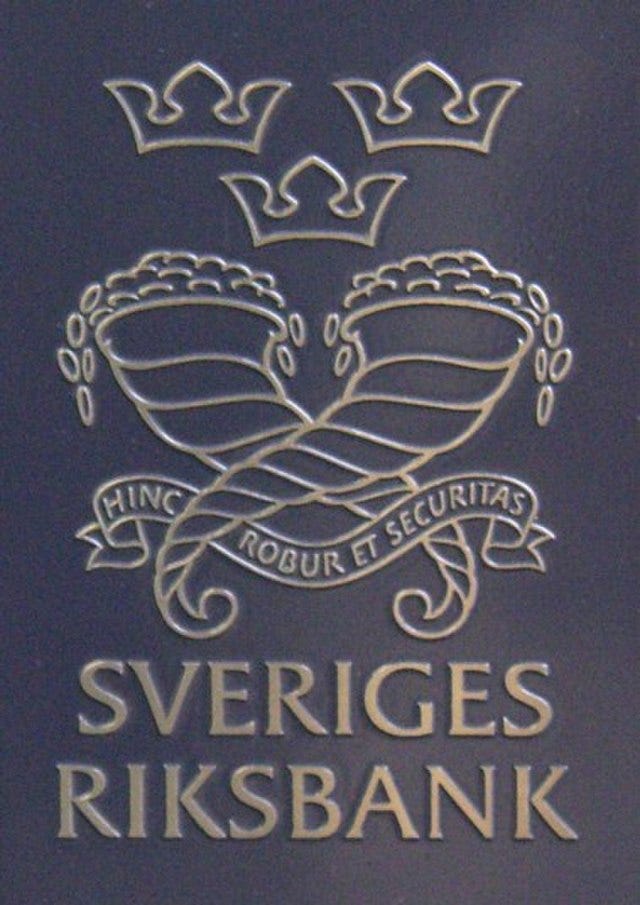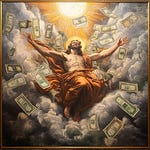Dear readers, TikTok has a great feature that allows you to repost videos from last year “on this day.” This was one of my stronger posts from last year so I thought I would share it here as well. I hope you enjoy…
Did you know that the Nobel Prize for Economics is a total sham?
Despite the fact that economists are awarded a “Nobel Prize” every year, it’s not actually a Nobel at all. The official name of the economics prize is our first clue: The Sveriges Riksbank Prize in Economic Sciences in Memory of Alfred Nobel. Sweden’s central bank puts up the money for this prize “in memory” of Alfred Nobel.
The pretense is that this award somehow honors Nobel, but it is in fact just a clever bit of marketing to steal credibility by associating the Nobel name with the field of economics. While it is awarded at the same time and the same ceremony attended by the Swedish royal family, this prize is - total baloney.
The actual Nobel Prize, as you may already know, is named for Alfred Nobel. Nobel was the inventor of dynamite. He made a huge fortune but was also aware of the potential threat to humanity posed by the dangerous explosives he created. After he died in 1896 he used 94 percent of the wealth from his estate to establish the Nobel Prizes. The idea was that these would be awarded to those who, in his words “shall have conferred the greatest benefit on mankind.” For the first 70 years the prize was awarded in five different categories - chemistry, physics, medicine, literature, and of course, the Peace Prize.

Now, there has been a lot of criticism, much of it justified, against some past Peace Prize winners. For example, there was Henry Kissinger, who perpetrated a secret war in Cambodia and Laos with Richard Nixon and has the blood of hundreds of thousands on his hands. Or Yasser Arafat, who embraced terrorist tactics after taking his prize. Or even Barack Obama, who won the prize in 2009 before he had even served as president for a year and before dialing his drone murder campaign up to 11. The people who award the Nobel prizes are not perfect and they can’t see the future. But the name still carries a lot of weight. However flawed the Nobel might be, the Nobel Prize for economics is worse.
“The Nobel prize in economics diminishes the value of all other Nobel prizes,” wrote
three prominent scientists, members of the Nobel committee, in Dagens Nyheter, a Swedish daily newspaper in 2004. Laying out in meticulous detail the unscientific nature of economics, these three Swedes scoff at the notion that the economics prize be allowed to remain in the company of the other Nobels. They wrote, “The basic problem is that economic science cannot be compared to natural sciences. Especially physics and chemistry are universal in the sense that their findings are equally valid in the U.S. as they are in China or Germany. They are independent of politics and economic systems. The equations governing the construction and durability of a concrete bridge are the same irrespective of country.”

The implication is clear: Nationality and politics influence the findings of economists.
One economist’s results are not necessarily replicable in another time or place. Economists’ results are unscientific because they don’t actually use the scientific method. Simply using mathematical equations does not make economics scientific.
Some of the most persistent critics of the economics prize have been the Nobel family.
On the 100th anniversary of the original Nobel prizes in 2001, four Nobel family members published an open letter complaining that the economics prize degrades and cheapens the other prizes. In 2005 Peter Nobel, the great-great nephew of Alfred Nobel, lamented the economics prize as “a PR coup by economists to improve their reputation.”
The Economics Prize (in Memory of Alfred Nobel) began with some very concrete goals by Sweden’s central bank in the 1960s. Democratic accountability in Sweden was perceived as holding back profits for the Bank of Sweden and Swedish business interests. The Swedish central bank’s main objective was to loosen political restrictions and democratic oversight, so as to unleash the power of the market.
The problem was that, at the time, nobody took neoclassical economic ideas very seriously. According to Notre Dame professor Philip Mirowski, “In order to support that position, the bank needed to claim that it had a kind of scientific credibility that was not grounded in political support.”
It’s unclear exactly what happened behind closed doors, but in 1969, in the middle of an ideological battle with some very clear stakes, the Swedish central bank announced the creation of the new economics “Nobel,” supposedly to celebrate the bank’s 300th anniversary. Chosen to oversee the award selection committee was Swedish economist Assar Lindbeck, with ties to none other than Milton Friedman’s Chicago School. Lindbeck played it cool for the first few years before going full-on free market. But soon enough, before the economics prize was even 10 years old, both Fredrich Hayek and Milton Friedman were freshly minted Nobel Laureates.
The Sveriges Riksbank Prize was awarded to 93 people in the first 55 years of its
existence (2023). Of those award-winners, 33 have been associated with the University of Chicago’s business school or the economics department made famous by Milton Friedman – that’s more than one-third! Neoclassical and neoliberal economists are about the only ones who ever win this ersatz Nobel. As UK economics professor David Spencer critiqued, “The award of the economics Nobel is, in fact, an award for conformity to neo-classical economics. Other schools of economic thought do not get a look in.” The influence of Karl Marx or even John Meynard Keynes is virtually guaranteed to get an economist a one-way ticket to the award committee’s reject pile.
But it seems apparent that was exactly the point. Writer Yasha Levine points out, “What started as a project to help the Bank of Sweden achieve political independence, ended up boosting the credibility of the most regressive strains of free-market economics, and paving the way for widespread acceptance of libertarian ideology.” Before his economics Nobel, Friedrich Hayek was a washed-up loser who depended on the charity of billionaire zealots like Charles Koch to pay his rent. After the award, Road to Serfdom became a bestseller and Margaret Thatcher started waving a copy in parliament like a blood-drenched flag. Hayek’s newfound fame and mainstream acceptance were key to establishing the libertarian Cato Institute. Milton Friedman enjoyed a similar reversal of fortune and went from rubbing shoulders with South American dictators to having his own bestseller, advising President Reagan, and hosting a series on public television.
So the next time you hear about a Nobel Prize-winning economist... just remember to insert a big old asterisk next to that title. There is no such thing as a Nobel Prize in economics. It's an award given by a bank to people who help justify the existing capitalist system.
Please give a like, comment, restack, and share so that others can find me here on Substack.
Let's make them pay.


















Share this post